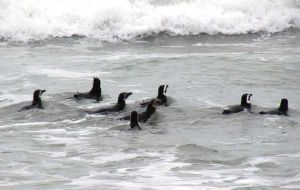MercoPress. South Atlantic News Agency
Satellite tracking of penguins' migration in South Atlantic
 Penguins carrying satellite transmitters
Penguins carrying satellite transmitters This week Professor Dee Boersma and student Elizabeth Skewgar, selected six adult male penguins from rehabilitation centres at two coastal towns in Southern Argentina--San Clemente del Tuyú and Mar del Plata--to carry satellite transmitters during their migration back to their breeding colonies reports www.penguinstudies.org
The transmitters were clipped on healthy, robust birds in good body condition that were likely to be eager to get back to their colony to begin breeding. The purpose of the experiment is to follow their ocean route and determine if they are going south along a well-defined route. Through late October the birds' movements will be tracked by the Argos satellite system, operated by the National Oceanic and Atmospheric Administration and the French space agency. The satellites will pass overhead providing the penguins' exact locations which are to be chartered on a tracking map to determine the route or routes penguins follow on returning to their rookeries. Professor Dee Boersma is a Biology professor from the University of Washington who has worked for 25 years as the head of the Magellanic Penguin Project at Punta Tombo, Argentina, which is the birds' largest breeding colony in South America. In related news and from neighboring Uruguay, following several weeks of rehabilitation a group of penguins rescued from an oil spill was released back to sea. The operation was undertaken by a rescue crew from IFAW (International Fund for Animal Welfare) and the Uruguayan organization SOCOBIOMA (the Society for the Conservation of Biodiversity in Maldonado). The rescue and rehabilitation operation not only saved the lives of penguins but also made it possible for IFAW to share its expertise in carrying out this type of rescue operation with SOCOBIOMA. "When a bird's plumage is contaminated with oil or any chemical, it loses its permeability and, as a consequence, its ability to regulate its body temperature. In this case, the penguins are forced out of the freezing waters in a state of hypothermia, which leads to dehydration and starvation," said Dr. Rodolfo da Silva from IFAW. More than forty Magellan penguins have been cared for at the SOCOBIOMA centre in Maldonado, Uruguay. "We are very pleased to be able to have released the first group of penguins. This is an achievement we owe to the dedication and professionalism of our volunteers and specialists" Dr. Lourdes Casas of SOCOBIOMA declared.




Top Comments
Disclaimer & comment rulesCommenting for this story is now closed.
If you have a Facebook account, become a fan and comment on our Facebook Page!